
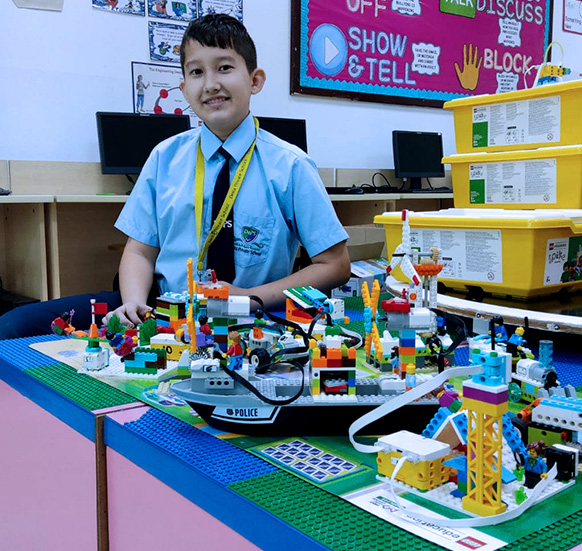
DePS is proud to provide a wealth of opportunity and challenge through a carefully crafted and expertly delivered, Enrichment Programme. Our outstanding facilities and inspiring staff, nurture students to discover their passion and reach their potential, regardless of ability or aspiration. We aim to provide the spark that lights the flame in each student and help keep it burning.
All pupils are encouraged to participate widely across academic, art, performance, language, design and sporting activities, all of which are focused on bespoke learning journeys and outcomes.
In addition to the subject-specific skills, much sought-after ‘soft skills’ of leadership, collaboration, resilience and perseverance that help prepare students for life are central to our programme.
Additionally, we offer lunchtime Enrichment Clubs, as well as a wide range of extra-curricular activities and competitive opportunities, to challenge our students further. Our diverse Creative and Performing Arts curriculum comprises art and design, creative writing, music, drama, dance and ballet, debate and public speaking.
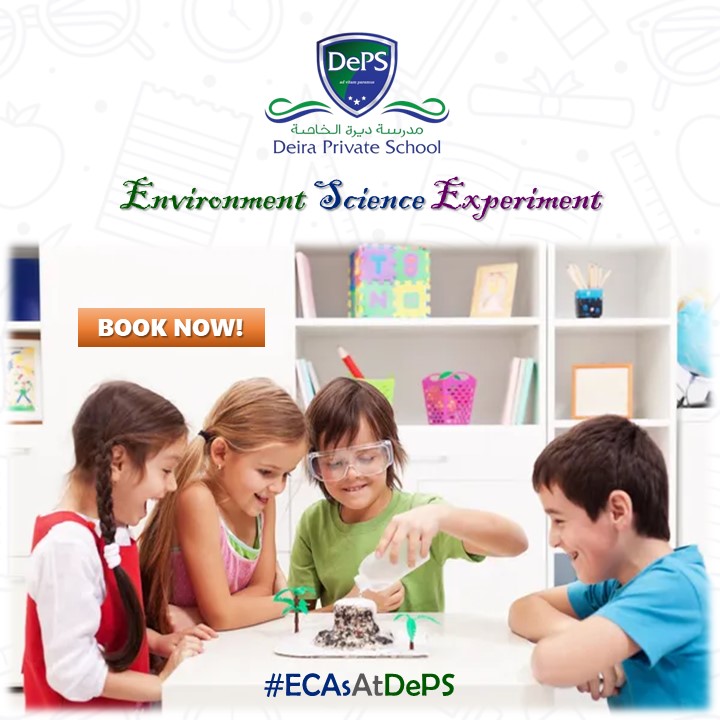
DePS SkillSet: Critical Thinking, Creativity, Collaboration, Sustainability, Innovation, Citizenship, Risk Taking, Growth Mindset
Science education activities provide children with opportunities to develop and practice many different skills and attributes. These include communication skills, collaborative skills, team working and perseverance, as well as analytical, reasoning and problem-solving skills.
Science Experiments introduce new ideas to students with hands-on and project based methodology. It also nurtures intellectual curiosity, helping students acquire new ways of asking questions and understanding the world.
Environmental education (EE) connects students to the world around them, teaching them about both natural and built environments. EE raises awareness of issues impacting the environment upon which we all depend, as well as actions we can take to improve and sustain it.
Environmental Education encourages students to research, investigate how and why things happen, and make their own decisions about complex environmental issues. By developing and enhancing critical and creative thinking skills, EE helps foster a new generation of future consumers, producers as well as decision makers.
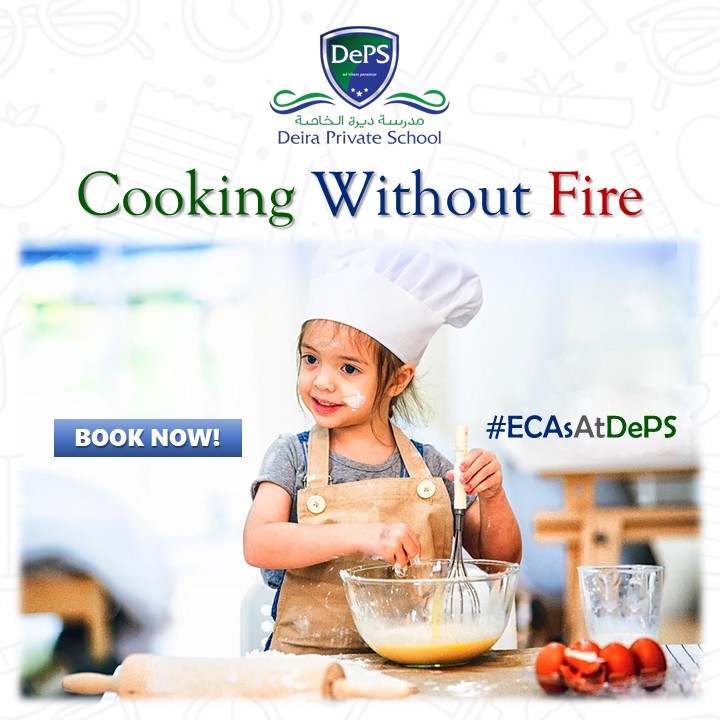
DePS SkillSet: Creativity, Critical Thinking, Communication, Wellbeing, Citizenship
There are many benefits of cooking without fire:
Social-Emotional Development: Hands on cooking activities help children develop confidence and skill. Following recipes encourages children to be self- directed and independent, it also teaches them to follow directions and develop problem-solving skills.
Physical Development: Fine motor and eye-hand coordination skills are developing by chopping, mixing, squeezing, and spreading.
Cognitive Development: Cooking encourages children’s thinking, problem-solving, and creativity. It also allows children the opportunity to use the knowledge they have and apply it by counting, measuring, following a sequence, following directions, and cause and effect.
Language Development: Cooking offers the opportunity to develop language development by linking it to all other areas, including Mathematics, Science, Social Studies, Arts, and Literacy. This is done by encouraging children to talk about what they are doing, counting, and watching materials change color, texture, and medium.
Cooking develops math, science and comprehension skills. To help our children learn about math, our educators assign simple tasks such as counting fruits or measuring out ingredients like flour. Reading recipes along with them is another great way to help boost their comprehension skills, and understand about different processes like blending or mixing.
Cooking is also a great way to see science in action! Our children love seeing how the different ingredients are instantly transformed before their eyes into a delicious dish.
Cooking also encourages children to explore and try different healthy food items. It also teachers them about responsibilities and keeping their areas clean.
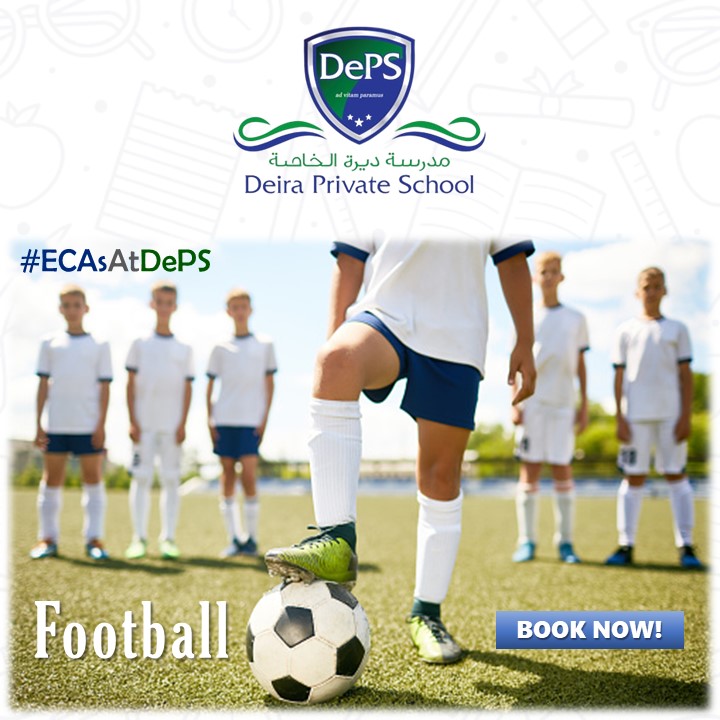
DePS SkillSet: Critical Thinking, Communication, Collaboration, Leadership, Well-being, Citizenship
Football, also known as soccer, is a popular game worldwide, enjoyed for its exciting action and strategy.
According to various studies, football helps enhance fitness by:
Boosting aerobic capacity & endurance;
Reducing high blood pressure & improving cardiovascular health;
Building muscle & minimizing body fat;
Strengthening bones;
Minimizing the probability of injury;
Increasing flexibility.
Football plays a significant role in forging and promoting friendships. With all of these people working towards ensuring the game's success, social skills and bonds are developed. Football also works well in fostering teamwork and cooperation.
As learners move up the ranks of their school football teams, they learn invaluable leadership skills. Football also enhances discipline, time management and good work ethics.
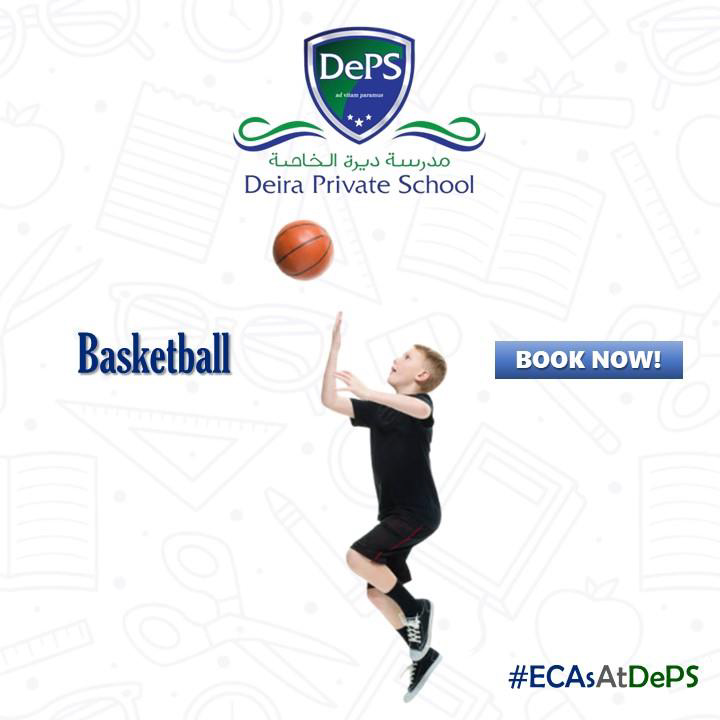
DePS SkillSet: Critical Thinking, Communication, Collaboration, Leadership, Well being, Citizenship, Growth Mindset, Risk taker
Take it from us, sports can be a Game Changer
Taking part in sport can help students feel fitter, healthier and mentally strong, and that is just the start of it Sport can also be fun, especially when played as part of a team or with friends
Exercise and sport triggers chemicals in the brain that can make you feel happier and relaxed The exercise and fitness benefits of sports, promote a good night’s sleep
Your heart is a muscle and needs frequent exercise to help it keep fit and healthy A healthy heart can pump blood efficiently around your body Your heart will improve in performance when it is regularly challenged with exercise Stronger hearts can improve overall health of the body Regular sport causes more oxygen to be drawn into the body with carbon monoxide and waste gases expelled This increases the lung capacity during sport, improving lung function and efficiency
All sport teams need leaders to show the way and help develop new or younger team members Many studies have found a correlation between playing sports and strong leadership qualities Sports enable people to develop a ‘team mindset whether its winning, losing or training together

DePS SkillSet: Risk Taking, Well-being, Growth Mindset
Here are the top 10 benefits of gymnastics for young children.
1. Coordination and Flexibility
Gymnastics help the child gain coordination and flexibility that they will carry with them throughout their school years and even into adulthood.
2. Sportsmanship and Social Skill Building
Since gymnastics is an individual sport within a group environment, children learn a very healthy sportsmanship attitude. Gymnasts cheer each other on, compete in healthy ways with smiles and encouragement, and understand that their fellow gymnasts are hard working athletes just as they are. They set and reach goals similarly as well as celebrating accolades together.
3. Fundamentals of Movement
For the youngest children who take gymnastics, fundamentals of movement are a great asset to growing up. Not only do they learn movement patterns and develop amazing dexterity, they also learn the art of graceful movement and poise.
4. Discipline, Listening, and Determination
In order to achieve great discipline in life we must learn to listen and follow directions well. That leads to wanting to learn more and a determination that drives us to great heights. This all can be achieved both literally and as life assets through gymnastics.
5. Self Esteem and Confidence
Gymnastics goes a long way in helping to build great self esteem and confidence in young people.
6. Goal Setting
Goal setting is very important in everyday life. Gymnastics classes help to set a frame of mind in each individual that success comes from setting goals, both big and small, and working continually towards those goals. Setting goals and keeping a good perspective helps the individual to manage stress levels and anxiety that might arise in sports and life in general. Striving to achieve these physical goals translates into striving to achieve other goals as well, like doing better in school work, participating successfully in extra-curricular activities, and working harder towards a college or career track.
7. Strength and Power
These two things are very high on the list of extra benefits achieved through gymnastics.
8. Skills to Enhance Other Athletic Sports
Strength, coordination, and flexibility are all great things learned through gymnastics that will help a child in the other athletic sports they participate in during their adolescent years.
9. Health Benefits
The long term health benefits are tremendous with enrollment in continued gymnastics classes. Gymnastics helps maintain healthy body weight, improves circulation, and helps maintain a healthy growing environment for the body.
10. Fun
And last but certainly not least, it’s fun!
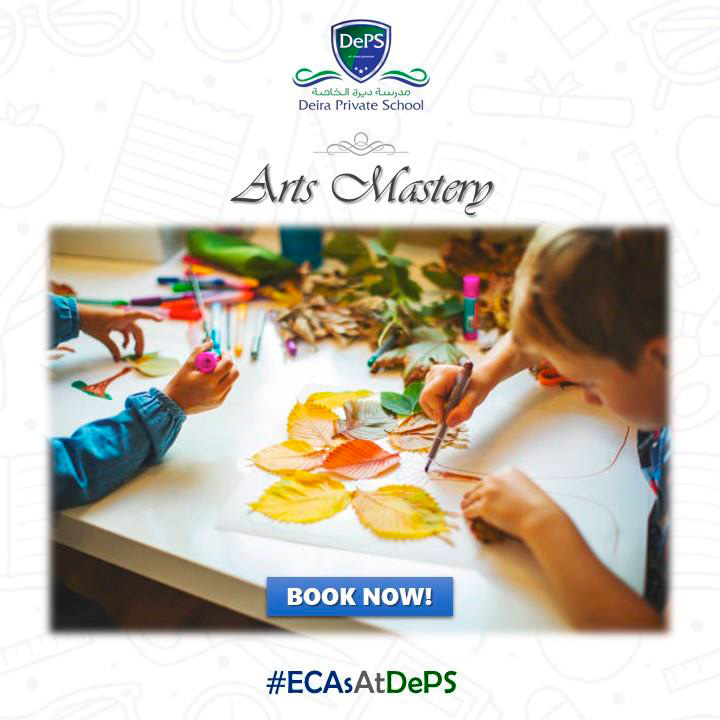
DePS SkillSet: Creativity, Innovation, painting, drawing, sculpture
Unleash your creativity and embark on a journey of artistic expression with our Art Mastery extracurricular activity at Deira Private School.
Designed to nurture budding artists and cultivate their talents, Art Mastery offers a dynamic platform where students can explore various mediums, techniques, and styles. Led by an experienced instructor, participants will delve into painting, drawing, sculpture, and more, honing their skills and building a strong foundation in the world of art.
Join us in this enriching experience that not only fosters individual growth but also encourages collaboration and imagination. Ignite your passion for art and unveil your true artistic potential with Art Mastery at Deira Private School.
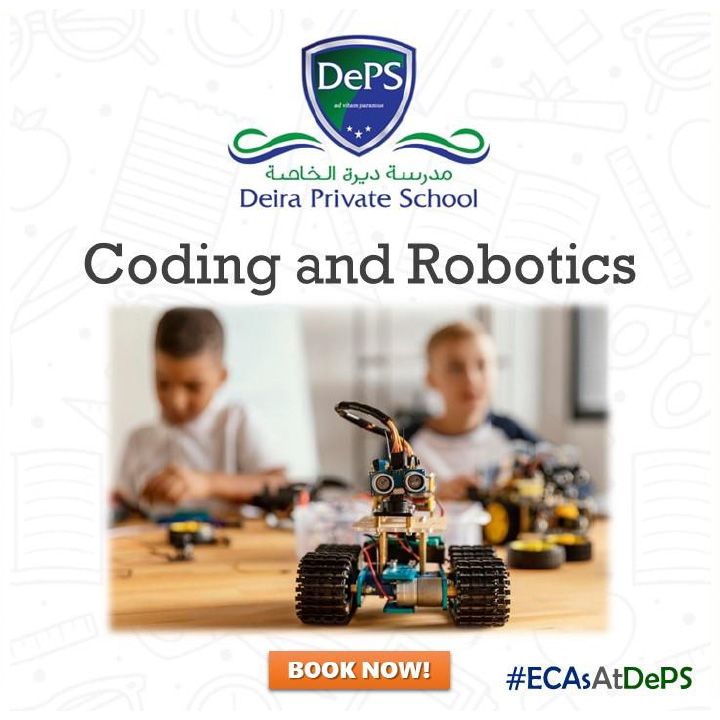
DePS SkillSet: Critical Thinking, Creativity, Collaboration, Sustainability, Innovation, Citizenship, Risk Taking, Growth Mindset
Ignite your child's passion for technology and innovation
with our cutting-edge Coding and Robotics
extracurricular activity designed to inspire young minds,
this program offers an exciting journey into the world of
programming and robotics, where students will learn to
create, problem-solve, and explore through hands-on
experiences.
Our expert instructors will guide participants in
mastering coding languages, unleashing their creativity
to develop interactive games, apps, and websites.
With a focus on robotics, students will also delve into the
realm of automation and artificial intelligence, building
and programming their own robots to perform tasks and
navigate challenges.
By joining this transformative activity, your child will not
only acquire essential STEM skills but also cultivate
teamwork, critical thinking, and perseverance in a fun
and dynamic environment. Prepare your child for a future
of endless possibilities – enrol them in the Coding and
Robotics program today!

DePS SkillSet: Communication, Collaboration, Growth Mindset, Risk Taking, Leadership, Enterprise
World Scholar's Cup is a premier international academic event attracting students from all over the world, resulting in "a global community of future scholars and leaders".
The World's Scholar Cup (abbreviated WSC) is an international team academic program with more than 15,000 students participating from over 65 countries every year.
Each WSC Round consists of four main events: the Scholar's Challenge, Collaborative Writing, The Team Debate, and the Scholar's Bowl. In addition to these four main events, non-competitive activities take place which are both social and academic.
There are 4 key challenges as part of the India Round
Team Debate - Each team debates three times, on motions across all the subjects, from policy to poetry. You may be arguing whether parents should have access to surveillance cameras at schools - or whether women make better superheroes. Debate is your chance to apply all that you've learned to make the most persuasive case you can. And, win or not, after each debate, you'll give the other team feedback on how to improve.
Scholar's Bowl - Every team in the theater. Every team with a clicker. Every question harder than the one before. Your team will work together to solve analytic questions and multimedia challenges. Click your answers before time runs out, and don't be surprised if you're asked to connect a poem you studied to a clip from your favourite TV Show
Collaborative Writing - Speak with the power of your pen (or pencil!) You'll be given six prompts, from each of the six subject areas, ranging from creative scenarios to explore to persuasive arguments to make. Two easy rules to remember: as a team you only need to write three of the six, and each of you needs to answer a different prompt.
Scholar's Challenge - It's multiple choice, so make multiple choices. The Challenge looks like any other test, but with an alpaca-powered twist: you can mark more than one answer per question. The fewer you mark; the more points you can earn if you're right.
The World Scholars Cup is highly recommended for students aged 10 and above.
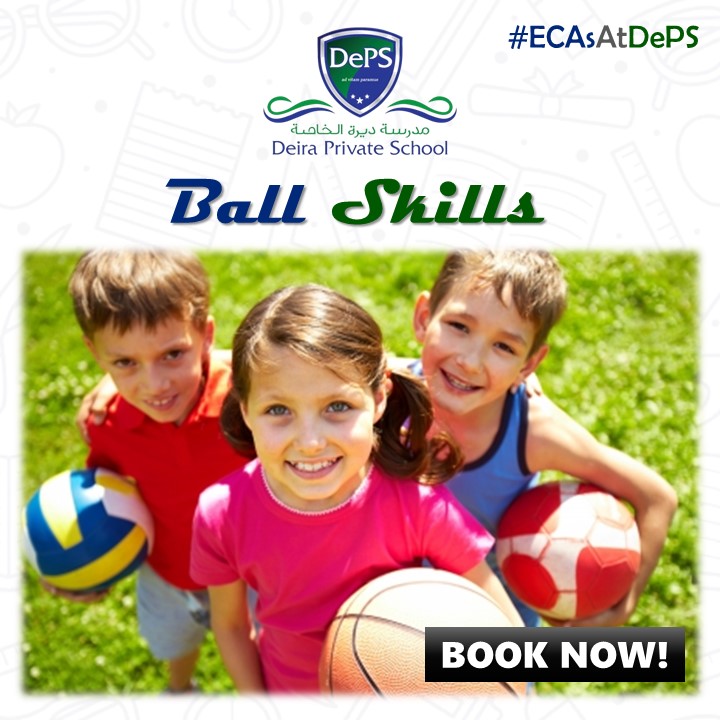
DePS SkillSet: Critical Thinking, Communication, Collaboration, Leadership, Well-being, Citizenship, Growth Mindset, Risk taker
Take it from us, sports can be a Game Changer.
Taking part in sport can help students feel fitter, healthier and mentally strong, and that is just the start of it. Sport can also be fun, especially when played as part of a team or with friends.
Exercise and sport triggers chemicals in the brain that can make you feel happier and relaxed. The exercise and fitness benefits of sports, promote a good night’s sleep.
Your heart is a muscle and needs frequent exercise to help it keep fit and healthy. A healthy heart can pump blood efficiently around your body. Your heart will improve in performance when it is regularly challenged with exercise. Stronger hearts can improve overall health of the body. Regular sport causes more oxygen to be drawn into the body with carbon monoxide and waste gases expelled. This increases the lung capacity during sport, improving lung function and efficiency.
All sport teams need leaders to show the way and help develop new or younger team members. Many studies have found a correlation between playing sports and strong leadership qualities. Sports enable people to develop a ‘team mindset’ whether its winning, losing or training together.
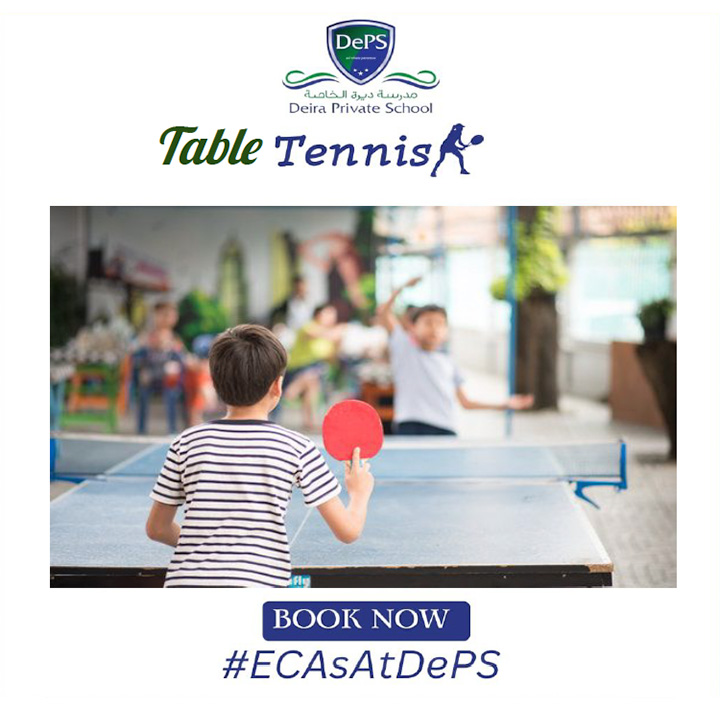
DePS SkillSet: Encompass technical, physical, and mental aspects of the game.
Take it from us, sports can be a Game Changer.
Taking part in sport can help students feel fitter, healthier and mentally strong, and that is just the start of it. Sport can also be fun, especially when played as part of a team or with friends.
Exercise and sport triggers chemicals in the brain that can make you feel happier and relaxed. The exercise and fitness benefits of sports, promote a good night’s sleep.
Your heart is a muscle and needs frequent exercise to help it keep fit and healthy. A healthy heart can pump blood efficiently around your body. Your heart will improve in performance when it is regularly challenged with exercise. Stronger hearts can improve overall health of the body. Regular sport causes more oxygen to be drawn into the body with carbon monoxide and waste gases expelled. This increases the lung capacity during sport, improving lung function and efficiency.
All sport teams need leaders to show the way and help develop new or younger team members. Many studies have found a correlation between playing sports and strong leadership qualities. Sports enable people to develop a ‘team mindset’ whether its winning, losing or training together.
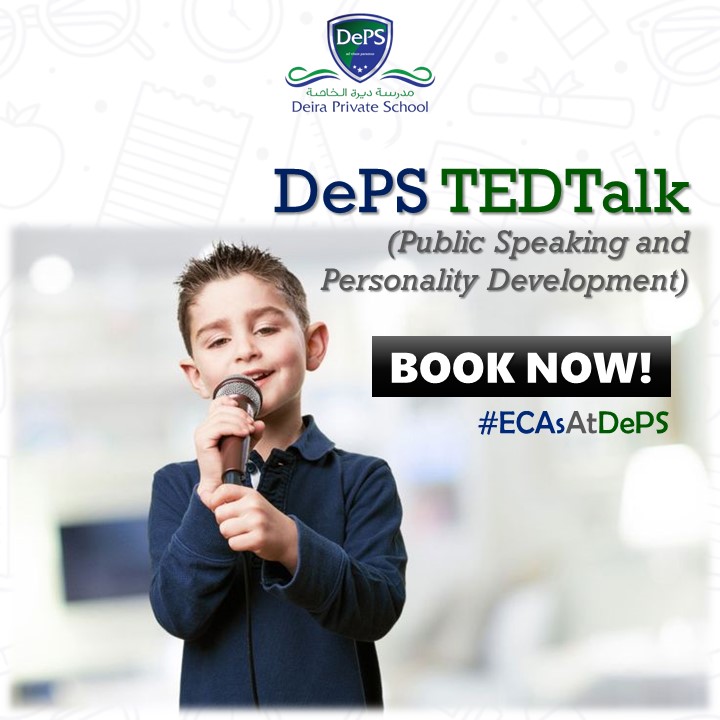
DePS SkillSet: Communication, Creativity, Critical Thinking, Leadership, Enterprise, Citizenship, Risk Taking, Growth Mindset
‘Speech’, they say, is the best gift to the human race. Being social creatures, the ability to communicate with the world is something that makes us unique amongst all other creatures. It enables us to express our emotions and thoughts, share our ideas and develop new relationships.
When you speak coherently, especially in front of an audience, it helps you hone your presentation skills. Today, students are required to give presentations in the form of academic projects.
Who wouldn’t love to influence people around them? History suggests that famous leaders have always been capable of influencing or instigating masses thanks to their power of great articulation.
To be a leader, you must possess excellent public speaking skills.
When you share your ideas, standing on the dais and speak with authority, you capture the attention of your audience and are able to persuade others.
When you give a speech in front of the public, it can help you develop your vocabulary. It even brings fluency in the speech. You will know it by yourself the effect of the words that you speak and when you are going wrong you can figure it out. Public speaking can also help you understand the need of speaking differently among different audiences.
Public speakers motivate their listeners to make a change. It could be to stop or start something, try something new, or reach their goals.
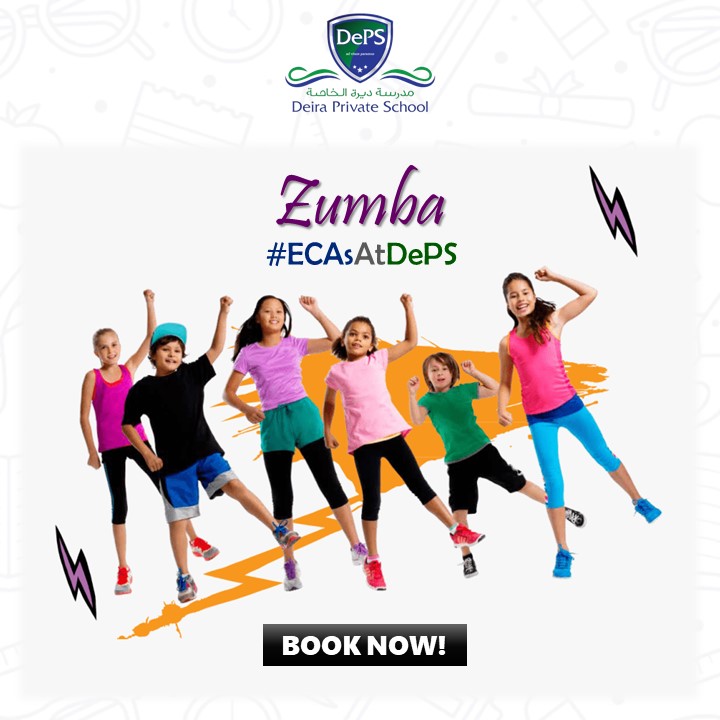
DePS SkillSet: Risk Taking, Well-being, Growth Mindset
Like all sports activities for a child, Zumba is useful for the harmonious development of a growing body. The cardiovascular system and respiratory organs are trained. All muscle groups develop, even posture. The movements become more agile and flexible.
Zumba provides both physical and psychological benefits. Studies show that moderate-intensity dance is linked to better cardiovascular health and cognitive benefits. Plus, people who practice Zumba, in particular, tend to feel more independent and purposeful in life. It's good for your body and mind.
In order to achieve great discipline in life we must learn to listen and follow directions well. That leads to wanting to learn more and a determination that drives us to great heights. This all can be achieved both literally and as life assets through Zumba.
Zumba goes a long way in helping to build great self esteem and confidence in young people.
Strength and Endurance are two things are very high on the list of extra benefits achieved through Zumba that will help a child in the other athletic sports they participate in during their adolescent years.
The long term health benefits are tremendous with enrollment in continued Zumba classes.
Aerobics helps maintain healthy body weight, improves circulation, and helps maintain a healthy growing environment for the body.
And last but certainly not least, it’s fun!

DePS SkillSet: A combination of physical, technical, and artistic skills.
Like all sports activities for a child, Zumba is useful for the harmonious development of a growing body. The cardiovascular system and respiratory organs are trained. All muscle groups develop, even posture. The movements become more agile and flexible.
Zumba provides both physical and psychological benefits. Studies show that moderate-intensity dance is linked to better cardiovascular health and cognitive benefits. Plus, people who practice Zumba, in particular, tend to feel more independent and purposeful in life. It's good for your body and mind.
In order to achieve great discipline in life we must learn to listen and follow directions well. That leads to wanting to learn more and a determination that drives us to great heights. This all can be achieved both literally and as life assets through Zumba.
Zumba goes a long way in helping to build great self esteem and confidence in young people.
Strength and Endurance are two things are very high on the list of extra benefits achieved through Zumba that will help a child in the other athletic sports they participate in during their adolescent years.
The long term health benefits are tremendous with enrollment in continued Zumba classes.
Aerobics helps maintain healthy body weight, improves circulation, and helps maintain a healthy growing environment for the body.
And last but certainly not least, it’s fun!

DePS SkillSet: Creativity, Critical Thinking, Communication, Wellbeing, Risk Taking, Well-being, Growth Mindset
Elevate your strategic thinking and engage in a battle of minds with the Chess extracurricular activity at Deira Private School.
Our Chess program offers students the opportunity to sharpen their intellect, enhance problem-solving abilities, and embrace healthy competition.
Whether you're a beginner eager to learn the intricacies of the game or a seasoned player looking to refine your skills, our expert coach provides provides comprehensive guidance and training.
Through Chess, students not only master the art of foresight and planning but also develop patience and resilience. Join us in this intellectually stimulating journey that fosters critical thinking and camaraderie. Discover the world of Chess and make your moves count on and off the board.
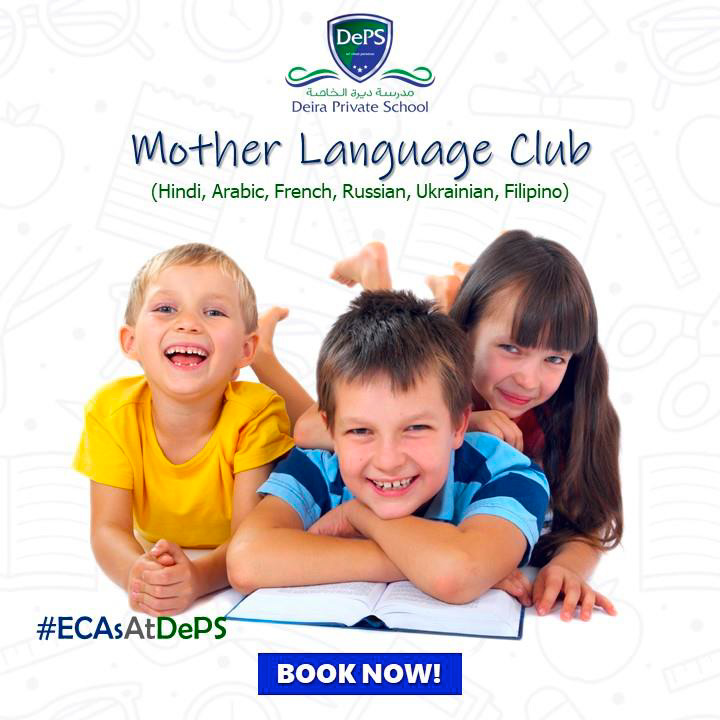
DePS SkillSet: Communication, Growth Mindset, Citizenship
Celebrate the beauty of diversity and connect with your roots through the Mother Language Extracurricular Activities Club.
Our club is a vibrant melting pot of linguistic and cultural exploration, offering students the chance to delve into languages such as Hindi, Arabic, French, Russian, Ukrainian, and Tagalog.
Immerse yourself in the rich tapestry of words, expressions, and traditions that make up these languages, all while fostering a deep appreciation for global cultures. Led by native-speaking mentors, the club provides an interactive and engaging environment where language skills flourish naturally.
Whether you're keen on mastering a new tongue or preserving your heritage, the Mother Language Club is your gateway to a world of meaningful connections and enriched cultural experiences. Join us in celebrating linguistic diversity and building bridges that span the globe!
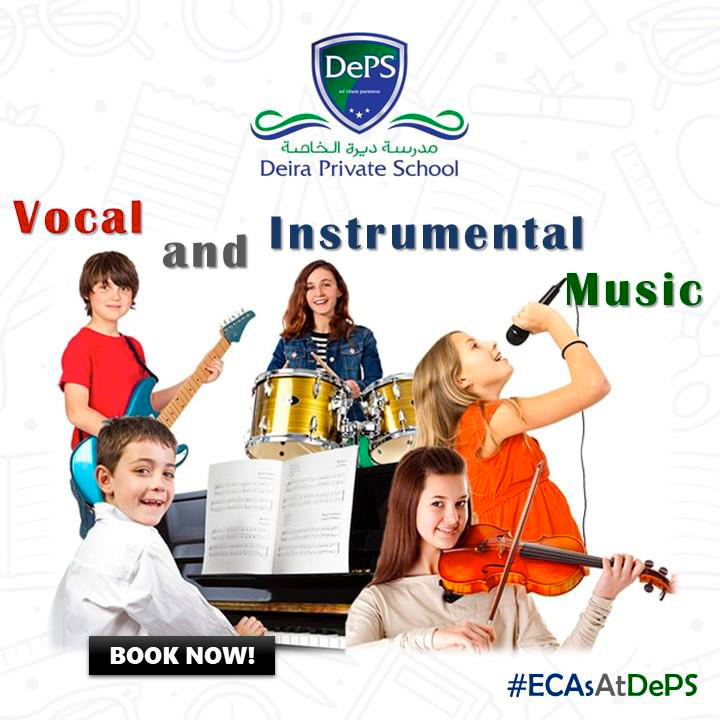
DePS SkillSet: Creativity, Critical Thinking, Communication, Wellbeing, Citizenship
Elevate your passion for music to new heights with the Vocal & Instrumental Music Extracurricular Activity. Whether your heart beats to the rhythm of a song or you're drawn to the melody of an instrument, our program offers a harmonious blend of creativity and skill- building.
Immerse yourself in the world of vocals, learning to express emotions through your voice, or pick up an instrument of your choice to create enchanting tunes.
Our experienced music instructor provides personalised guidance, helping you refine techniques, discover your musical style, and develop confidence in performing.
From solo acts to group ensembles, our activities culminate in unforgettable performances that showcase your talents. Join us to discover the transformative power of music, where every note and lyric takes you on a melodious journey of self-expression and artistry.

DePS SkillSet: Critical Thinking, Growth Mindset
Ignite your curiosity and master the world of numbers with the Maths Influencers Extracurricular Activity.
This unique program is designed for students who are passionate about mathematics and eager to explore its real-world applications.
Led by our enthusiastic mentor, you'll delve into captivating problem-solving challenges, engaging discussions, and interactive projects that showcase the beauty of mathematical concepts. From unravelling complex patterns to deciphering the secrets of geometry, Maths Influencers equips you with the tools to become a true maths enthusiast and influencer.
Join us to embrace the power of numbers, unlock new dimensions of logical thinking, and shape a future where mathematics knows no bounds. Let your passion for maths lead the way in this exciting journey of discovery and innovation!

DePS SkillSet: Creativity, Critical Thinking, Communication, Wellbeing, Citizenship
Karate offers numerous benefits for children, both physically and mentally. Firstly, it promotes physical fitness by improving balance, flexibility, coordination, and overall strength.
Through regular practice, children develop better body awareness, motor skills, and reflexes. Additionally, Karate instills discipline and self-control, teaching young practitioners the importance of focus and perseverance. It also helps in building confidence and self-esteem as children progress and earn new belts, setting and achieving goals along the way.
Karate classes provide a safe environment where respect, teamwork, and personal growth are emphasized. Furthermore, this martial art enhances mental concentration, self-defense skills, and stress management. Overall, Karate empowers children, instills valuable life skills, and promotes a healthy lifestyle.

DePS SkillSet: Critical Thinking, Creativity, Collaboration, Citizenship, Risk Taking, Growth Mindset
Taekwondo offers numerous benefits for children, both physically and mentally. Firstly, it promotes physical fitness by improving balance, flexibility, coordination, and overall strength. Through regular practice, children develop better body awareness, motor skills, and reflexes.
Additionally, Taekwondo instills discipline and self- control, teaching young practitioners the importance of focus and
perseverance. It also helps in building confidence and self-esteem as children progress and earn new belts, setting and achieving goals along the way. Taekwondo classes provide a safe environment where respect, teamwork, and personal growth are emphasized. Furthermore, this martial art enhances mental concentration, self-defense skills, and stress management.
Children learn important values such as self-discipline, respect for others, and the ability to defend themselves if necessary. Overall, Taekwondo empowers children, instills valuable life skills, and promotes a healthy lifestyle.

DePS SkillSet: Creativity, Critical Thinking, Communication, Wellbeing, Citizenship
Kickboxing offers numerous benefits for kids, both physically and mentally. Firstly, it promotes physical fitness by improving strength, cardiovascular endurance, agility, and coordination.
Through the combination of punches, kicks, and footwork, children engage their entire body, resulting in increased
muscular endurance and improved overall fitness.
Kickboxing also helps in building self-confidence and
self-esteem as kids learn new techniques and see progress in their abilities. It provides an opportunity for children to set and achieve goals, earning belts or certifications as they advance.
Additionally, kickboxing enhances discipline and focus, as participants must follow instructions and maintain concentration throughout the training session. It also serves as a constructive outlet for stress and pent up energy, helping kids develop emotional resilience and stress management skills.
Furthermore, kickboxing classes often emphasize respect, teamwork, and sportsmanship, fostering a sense of
community and friendship among participants.
Overall, kickboxing offers a fun and effective way for kids to improve physical fitness, build self-confidence, enhance discipline, and cultivate important life skills.

DePS SkillSet: Physical fitness, Music Production, Collaboration and teamwork.
It encompasses four main elements: rapping (MCing),
DJing, graffiti art, and breakdancing (B-boying), each
contributing to the vibrant tapestry of the culture.
Rapping involves the rhythmic and rhyming
expression of personal and social themes, while
DJing focuses on innovative music mixing and beat
creation. Graffiti art uses visual creativity to make
bold statements on urban landscapes, and
breakdancing features energetic dance moves and
acrobatics.
Beyond its artistic components, hip hop serves as a
powerful medium for addressing social issues,
shaping fashion trends, and influencing language. Its
impact is profound and far-reaching, continuing to
inspire and unite people across diverse backgrounds
and cultures worldwide.

DePS SkillSet: Physical, technical, and mental skills.
Badminton is a dynamic and fast-paced sport
that combines agility, precision, and strategy.
Played with a shuttlecock and rackets, it can be
enjoyed in both singles and doubles formats.
The game requires exceptional reflexes and
quick footwork as players engage in rapid
exchanges of shots over a net. Key elements of
badminton include powerful smashes, delicate
drop shots, and strategic clears, each
demanding a blend of technique and timing.
The sport emphasizes endurance and flexibility,
as players must cover the court efficiently and
maintain high energy levels throughout the
match. With its origins in ancient games and
formalized in 19th-century England, badminton
has evolved into a global sport that captivates
enthusiasts with its blend of skillful play and
competitive excitement.